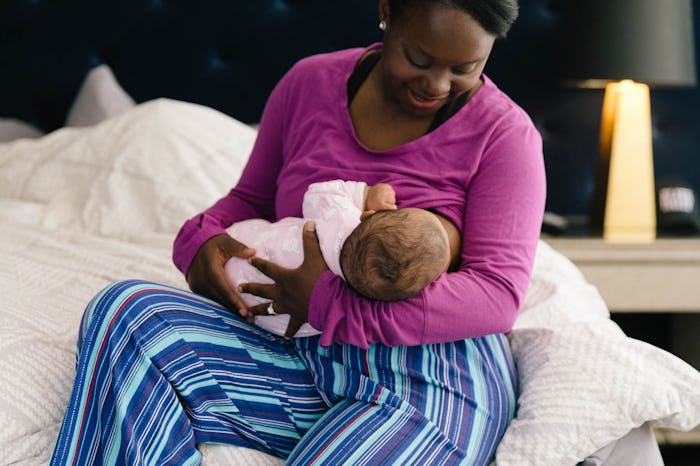Life
Everything You Need To Know About How Often Your Baby Will Breastfeed
Ever feel like you're breastfeeding all day every day — especially in the beginning? You're not alone. Babies need to nurse frequently, and that can take its toll. If you're wondering, 'how many hours per day does a baby breastfeed?' it's understandable. There are a few guidelines, according to experts. But honestly, watching the clock isn't always helpful.
"Breastfeeding is more about frequency than duration, especially in the first one to six weeks," explains Jamie O'Day, BS, RN, Certified Lactation Counselor (CLC), co-owner of the private nursing company, Boston NAPS, LLC, in an interview with Romper. "The recommendation is for newborns to eat 10 to 12 times a day for about 10 to 20 minutes on each breast. Longer feeds don't necessarily mean better feeds, so stressing number instead of duration is of utmost importance." OK, so let's assume your newborn feeds for 15 minutes, 12 times a day. By my calculations, your baby is nursing a total of three hours — by piecemeal. Does it feel longer? Probably. And because all babies are different, for some women, it really is.
However, O'Day stresses that duration isn't what matters when it comes to nursing, and Gay Bearzi, RN, BSN, International Board Certified Lactation Consultant (IBCLC), of the Lactation Team of Sinai Hospital of Baltimore, agrees. "In general, a mother should offer her breast every two to three hours or when the baby shows signs of hunger," explains Bearzi in an interview with Romper. She goes on to note that if your newborn baby isn't showing hunger signs after three hours, you should encourage a feed with cuddling and skin-to-skin time.
Remember, babies aren't robots. Sometimes they'll want to nurse more frequently, or for longer, than normal. (See: the dreaded clusterfeed.) Other babies wake more often at night, according to O'Day, and thus, require more feeds. "The key is to watch the baby more than you watch the clock," explains Bearzi, who notes that too-rigid scheduling can lead to problems down the line, and unneccessary stress for you.
Luckily for breastfeeding moms, babies grow older — and require less frequent feeding as they do. "You should be feeding your 3-month-old about seven to nine times in a 24-hour period, but again you should try and go by feeding cues from your baby," notes Bearzi. As long as your baby is gaining weight and wetting diapers, you're doing great, mama.
One thing I've always wondered — why do breastfed babies feed more frequently than those who use formula? According to Bearzi, babies simply have an easier time digesting breast milk, which means it moves through their system that much more quickly. She explains that breast milk takes two to three hours to digest, at which point your baby will likely alert you that they're running on empty.
The bottom line is that your baby will let you know when they're hungry, and for how long they want to stay at the breast. Bearzi doesn't want moms getting caught up in a numbers game, because learning feeding cues is so much more important. (Especially when your baby's a newborn, keeping track of wet diapers is, too.) To learn more about breastfeeding basics, she recommends moms join a breastfeeding group in their neighborhood.
Some babies like to take their time nursing — for comfort, or for the joy of it. (Good news there: you can't overfeed a breastfed baby, although you can wind up doing a lot more laundry.) Other babies nurse for 10 minutes, and are promptly ready for a snooze. How long your baby breastfeeds is actually less important than how frequently they nurse, so remember to offer them the chance to breastfeed every two to three hours. If you're concerned your baby's not gaining the proper amount of weight, or might be getting dehydrated, don't hesitate to give your pediatrician a call.
Check out Romper's new video series, Romper's Doula Diaries:
Check out the entire Romper's Doula Diaries series and other videos on Facebook and the Bustle app across Apple TV, Roku, and Amazon Fire TV.
